Episode 17: How Brillig, O, Beamish Boy
Previous: Episode Sixteen: A Nice Little Till to Tap Next: Episode Eighteen: King of the Mountain
A city street, a building with a sign that reads "Bank of Commerce." A thin little man walks in front of the bank. He stops, glances toward the entrance, then stands in front of the building reading a newspaper (or pretending to).
Sam exits the building holding an envelope, which he puts in his pocket. He takes a good look at the little man, then walks away.
A big man comes out of the bank and touches the little man on the shoulder. The pair begin to follow Sam.
Sam looks over his shoulder. He stops to buy a newspaper. The two men stop and stare, like a pair of automatons, into the window of a travel agency.
Now certain that he is being followed, Sam leads them on an obstacle race (not fast-paced, but full of obstacles). Then he rounds a corner where Honey, in the Cobra, is waiting at the curb. Sam only gets her attention long enough to toss the envelope into the car.
She drives away, leaving Sam in front of a recessed loading dock. He tosses his newspaper further down the sidewalk, past the loading dock's entrance, then ducks into the entrance where he turns his reversible jacket inside out, then puts on a cap and a pair of glasses.
 |
| (Notice that the pattern on Sam's reversible jacket may cause a "jumpy" visual effect called a moiré pattern.) |
The two men following him stop in front of the loading dock when they realize that Sam has disappeared. The big man spots the tossed newspaper and picks it up.
He gestures to the little man to follow him, and they set off in the direction in which the newspaper had been tossed.
Sam exits the docking area wearing his disguise. He looks stage left toward where the two men went. As he does so, a fat man wearing dark glasses approaches from the right. Sam bumps into him and apologizes.
"That's alright, sir," says the man, who seems to be blind as he taps on the sidewalk with his cane. "Sorry to bother you, but would you mind?" He points across the alley entrance with his cane. (Now, how did he know what was there?)
"No trouble," says Sam, taking the man by the arm and accompanying him across the entrance.
"Very kind of you, sir," says the fat man after they cross the entranceway.
"My pleasure," says Sam as he turns and heads back the way he came.
The "blind" man turns, raises his cane, and brings it down on the back of Sam's head.
He searches the prostrate Sam's pockets but finds nothing. He signals for someone to come, and the little man who had been following Sam joins the fat man and helps him pick Sam up.
After the opening credits, Honey is pacing in her apartment (which is hidden behind her office by a secret panel). She seems to be getting on her own nerves as well as those of Aunt Meg and perhaps even Bruce the ocelot. She throws a pillow and it hits Bruce accidentally.
Worried about Sam, she rehearses—for our benefit as well as Aunt Meg's—the facts of the case, which are these: A man named Ben Fancher gave Honey West and Company (at least that was the name of the company in the previous episode) two hundred dollars and a deposit box key, along with instructions to pick up a package from the bank and deliver it. But Honey is worried because Sam has not reported in.
"Don't worry, Honey," says Aunt Meg. "Good guys never die young."
"You're misquoting," says Honey. (The correct quotation is "Only the good die young," which is not so comforting.)
Following Meg's advice, Honey tries to call Fancher, but he checked out of his hotel without leaving a forwarding address.
Honey grabs up the envelope and rips it open. It contains half a million in fifty-thousand-dollar bills.
Honey is about to call the police when the doorbell rings. She tells Meg to hide the money, then goes through the secret panel and into her offices. (There is an inner office, and beyond it an outer office or waiting room.) At the door to her inner office she meets our faux blind man, and he has brought flowers. (Evidently, the outside door to the waiting room is never locked, at least not during business hours. After this episode, I would have advised a change in that policy.)
"For you, Miss West," he says, offering the flowers and introducing himself as Mr. Brillig (John McGiver). "The slithy toves and all that sort of thing?" he adds, as if probing to see whether Honey is educated enough to get the literary reference. "Well, few of us choose our own names."
Inviting him into her inner office, Honey asks him what he wants.
"Compensation, my dear, for a great deal of inconvenience. After all, a man is entitled to some benefits in his old age. Don't you agree?"
"Absolutely," begins Honey. Then, "Mr. Brillig, what are we talking about?"
"Ah, impetuous youth. Straight to the point. Very well, I have come to trade, Miss West. A certain package was picked up today, to be delivered to a man named Ben Fancher."
"I'm all ears."
"Oh, hardly that, Miss West, hardly that. I want that package, Miss West. I want it very badly."
"How sweet of you to bring these flowers."
"Dear, dear, dear. They're beginning to wilt already. How sad. How like life." He takes and crushes one of the flowers in his fist. "How fragile. (Raising his voice) Do you understand?"
"You have that package! I want it! And I want the man who hired you!"
"You said something about trading."
Calming himself, Brillig says, "So I did. This, I do believe, belongs to someone you know." He gives her Sam's wallet.
"How unfortunate for him if you refuse my kind offer to trade."
Honey goes to the door and opens it as if urging him to get out.
"Shall we stop the gyre and gimble, Mr. Brillig?" Honey signals unequivocally that she gets the literary reference posed by Brillig's name. (See notes below.)
Unfortunately, opening the door to the waiting room only lets in the riffraff, meaning two henchmen, Terk and an uncredited Hood, who are played, respectively, by Charles Horvath and Bill Hart. We have already seen Terk, he being the man in the white trench coat following Sam. Hart, wearing a dark trench coat, is not credited, which seems to be because he has no lines.
"Of course, we could look around for it ourselves," says Brillig.
"I'd hardly leave it lying around."
"I suppose not."
Honey tries to negotiate, demanding that Sam be freed first. But Brillig gives her an ultimatum: She has two hours to change her mind. "And may I suggest you forego calling the police." Not really a question.
"How will I get in touch with you?"
"The mountain will come to Mohamed," says Brillig, spreading his hands for emphasis.
(This is characteristic of Brillig's speech throughout the episode; it is pretentious, ponderous, pompous, and insufferable.)
Honey calls to Brillig, then moves too fast in reaching for something in her desk. The two hoods pull guns on her.
"Down, boys. You do have them over-trained," says Honey. She gives Brillig a pair of glasses for Sam, saying that he cannot see without them.
This seems implausible, since Sam has displayed perfect visual acuity since the moment he encountered these thugs. Nevertheless, they buy the story and accept the glasses, which, of course, produce a radio signal that Honey can track. The crooks on this show are always stuck in the 1950s, whereas H. West & Company has more advanced communications than the Starship Enterprise.
After the hoods depart, Honey rushes into her apartment where Meg is still trying to find a good hiding place for the money.
And Bruce is pestering her with affection.
(Anne Francis cannot have been the only cast member who found Bruce's attentions a-gnawing.)
Honey insists that, wherever Meg puts the money, Honey does not want to know where it is hidden. She gets out an electronic device to track the pair of glasses.
Just then, Ben Fancher (Norman Alden) calls. He wants Honey to meet him at Wong's Curio Shop on Fifth Street. When he suddenly hangs up, he does not give Honey much choice.
At the Curio Shop, Honey tells Fancher she is not giving him the package until she gets Sam back from the fat man. "Fat man?" says Fancher. "You saw the fat man?"
"Every pound," says Honey.
"Did he follow you?"
"Don't you think it's about time you told me what this is all about?"
"You don't understand. He'll kill me."
At this moment of dramatic tension, the proprietor, Mr. Wong (Leon Lontoc), enters from the back room and tries to sell them a lamp that belongs in a movie about Aladdin.
Meanwhile, Bill Hart, the actor who has no lines and no credit, is sitting in a car outside the shop, and he screws a silencer onto a pistol.
Back inside the shop, Wong is trying to interest Honey and Ben in what he claims is a lucky lamp. Suddenly the lamp is shot out of his hands. The report is louder than one might expect from a gun with a silencer on it, but, then, this is also a story where the bad guys are fooled by a homing device disguised as a pair of glasses. Nothing absolutely has to make sense.
Before she goes after Fancher, she advises, "Mr. Wong, if I were you, I wouldn't try to push any more of those lamps."
At "Mum's the Word Flower Shoppe," Sam is being held prisoner...
...and ostensibly watched over by the man from in front of the bank, Little Ardo (Howard Dayton). He seems more interested in watching violence on a portable TV set and adjusting the rabbit ear antennae, than in paying attention to Sam. Sam is tied up in a chair, but he is vigorously squirming and straining his ropes without Ardo noticing. (Indeed, he is not, as it turns out, tied to the chair; his ropes—as we will soon see—allow him to get out of the chair and hop around the room.)
Sam calls Ardo "Shorty." At this, Ardo puts a knife to Sam's throat and says that he does not like to be called that. (Well, who would?)
Sam says he does not like violence, but Ardo says, "That's why I like Westerns. All that fighting, all that killing. It fascinates me. But I don't like you at all."
"I can tell," says Sam.
Brillig walks in, demanding to know what is going on.
"He called me 'Shorty'," complains Shorty--er--Ardo.
"Near sightedness, my boy," explains Brillig, giving Sam the glasses. "He can't see a thing without his glasses."
While the three crooks go out to lunch,
Sam is left alone, and he activates the device and attaches it to the back of the TV, thereby boosting its signal.
 |
| (The crooks tied Sam up but not to the chair, allowing him bunny-hop around the room at will.) |
When Ardo returns and begins his viewing regimen again, his monkeying with the rabbit ears threatens to expose the homing device, but it is not to be exposed just yet.
Brillig comes in again and now notices that Sam is not wearing his glasses. They search...
 |
| (In the unlikely event that Sam hid his glasses under the couch cushions....) |
...until Terk (Charles Horvath) finds the glasses on the back of the TV and says, "Boss! Here they are!" (This would not be a big deal except that it is his first and only line, and undoubtedly the reason that he gets a cast credit.)
It finally dawns on Brillig that he has been duped.
"My boy, you're a card," he says to Sam, channeling the Fat Man in "The Maltese Falcon." "I like you after all. Turning adversity to advantage, eh? Well, my boy, we shall use your little scheme for our own purposes. Let him broadcast a signal. We will prepare a trap to catch some honey!"
(Pretentious, ponderous, pompous, and insufferable.)
Honey pulls up in the Cobra with her tracking device beeping away.
She sees the "Flower Shoppe" and goes in.
 |
| (Notice that the way honey is dressed suggests that it is raining.) |
Sam is gagged so that his furious gesturing—with his head and bound hands—falls on deaf ears, so to speak. Honey sets about freeing him. (Oddly, she turns off the TV before doing anything else.)
They are immediately surrounded by all four crooks.
"Well," says Honey to Brillig, "if it isn't Malice in Wonderland." Ever the clown, Honey shakes his extended hand.
Brillig is not amused. He snaps his fingers. So Honey gives him her pocket pistol. (Unwisely, she later forgoes an opportunity to replace it.)
"I guess you're all wondering why I asked you here," says Honey. Everyone is unamused.
Now Honey and Sam, are both tied up in chairs.
Ardo continues to watch TV instead of them. Honey gestures until Sam gets the idea of waiting for Ardo to lean forward to adjust the TV, then kicking the little man in the head, knocking him out. (We never see Ardo again; whether he is later captured by the authorities is unknown.)
This works well enough except that Sam hurts his foot.
"Well, that kick may win the game," says Honey. "Did you sprain it?"
"I haven't x-rayed it yet," says Sam, wincing.
She gives Brillig's cane to Sam. "Get your tin cup later."
But as Honey and Sam get in the Cobra, Brillig and the rest of his gang are watching and prepared to follow.
 |
| (You might notice the beads of rain water on the car. Much in this episode suggests that it has been raining, except that no rain is ever actually seen coming down.) |
Indeed, leaving Sam and Honey alone with Ardo made no sense because the crooks still need to get the money. Going out on the town while Ardo "watched" the prisoners was no way to accomplish that goal. But letting the private eyes escape—or think that they had—so that Brillig could follow them to the money, that makes perfect sense for a change.
Honey takes Sam back to her apartment where he can soak his foot in Epsom salts.
Sam spends the rest of the episode hobbling around, which explains why Honey will tie up this case without very much help from him.
"Really, Sam, you've just got to stop booting hard heads."
"I'll try to kick the habit," he says.
"Oof!" says Honey.
(You and the rest of us, sister.)
Honey goes into her living room to answer the phone, passing Meg and Bruce. The cat now wears a sweater vest.
The phone call is from Fancher who wants to meet Honey at an abandoned mine in a ghost town.
Honey asks Meg where the half million dollars is.
CUT TO: Sam calling for Honey. Instead, Meg turns up and tells him that Honey is gone. "She didn't want to disturb your foot."
"Where is she?!" demands Sam.
It turns out that she is driving into the ghost town, but driving a big boat of a car.
She did not take the Cobra because it is too easily spotted. (Which is why a serious private eye would not drive a Cobra in the first place.) For all the good that this nod to circumspection does in theory, Honey fails to realize that she is still being followed by Team Brillig, as she has been ever since leaving her offices to meet Fancher the first time.
Bruce is in the back seat,
and Honey tells him, "Keep an eye open for Wyatt Earp, baby."
Fancher is at the entrance to the mine shaft. He says, "Let's get out of the rain."
(There have been hints of rain elsewhere in this episode, but always the after effects rather than an actual drizzle from above. Here, there are ruts full of water in the road running through the ghost town, but still no rain coming down. I suppose they ran out of money in the budget for rain.)
Honey wants to know what "the game is."
"Miss West, it's not a game. Don't be coy," says Fancher, pulling a gun on her. "Where's the package?"
She bats it out of his hand. (This episode is short on martial arts, and this move is not the smartest.)
Just then, a shot rings out, and it does not come from Fancher's gun. Brillig has arrived with Terk and the Hood-With-No-Name in tow.
"Brillig and his slithy toves," says Honey as she and Fancher go into the mine shaft.
Brillig and his two armed, slithy toves advance and pick up Fancher's dropped gun. (Honey did not bring one, so both prey are unarmed.)
Down in the mine, Fancher and Honey find their option limited to one tunnel.
Fancher has a flashlight (electric torch) whereas Brillig and company must light their own path with a kerosene lantern.
The tunnel, which has tracks and mining cars, comes to a dead-end. Honey takes off her headgear and asks Fancher to explain what she is about to die for.
He says that he and Brillig had a fool-proof plan. (And a pretty boring one, too, actually.) They had a gambling operation, and Fancher put the proceeds in a safety deposit box, then went on a long vacation. Fancher eventually came back, and Brillig was waiting for him to go to the bank.
"It was a whole year! Who thought he'd wait so long?!"
As if in answer to his question, a bullet ricochets near them. Honey and Fancher duck.
"He's not waiting anymore," observes Honey as the gang walks toward them. She lights a fuse and throws it. The blast forces the gang to retreat.(By now we assume that Honey has so many accessorized gadgets about her person that she probably forgets that she has them much of the time.)
Meanwhile, the sheriff's car pulls up outside the mine (only, it says "Police" on the side of the vehicle). Sam and Sheriff Johnson (Monte Hale) get out. Sam is still hobbling and using Brillig's cane.
Brillig urges his henchmen not to be "afraid of a little smoke". He assures them that Honey and Fancher don't have another gun or they would have used it. "Go on! Get 'em!"
They go.
But Honey has another idea. She gets in a mining car. "Mr. Fancher, how would you like to run your own railroad?"
"What are you talking about?"
"Just give me your flashlight and push."
 |
| Honey grabs Fancher's flashlight. |
"Huh?"
"Push!"
He pushes her fast toward Brillig and his men. The car picks up speed...
...and knocks each of the two gunmen off of the track.
Honey jumps out of the car and hits Terk on the head with the flashlight before taking his gun.
Honey then confronts Brillig, who is armed only with a lantern.
"Diogenes, I presume," says Honey.
He is about to bring the lantern down on her head.
(Or try to—this would be a sensible time for Honey to shoot Brillig in his ample center mass, but Honey West never kills anybody.) At this moment, however, Sheriff Johnson and Sam start coming down the ladder into the mine. Brillig looks up and freezes.
"Come here, Jabberwocky," says Sam, putting the crook of the cane around Brillig's neck.
"Give a man enough cane, he'll hang himself," says Honey. That clearly applies to giving actors enough bad lines, as well.
Brillig groans, and Honey says, "No?"
No.
In the epilogue, Sheriff Johnson is holding Brillig and Fancher, and the latter says he wants to see the money before being carted away.
"One half million coming up," says Honey. It was under Bruce's sweater the whole time.
(Only, when Bruce was in the back seat of Honey's car, he was not wearing the sweater.)
"You're going to have to get on the wagon, Bruce."
"Huh?" says Sam.
"He was loaded," says Honey, obviously not having learned a single lesson about bad puns.
Sam is concerned that Bruce might have "Heard the call of the wild" and run away with the money.
"Yeah, with nine lives he would've had a ball," says Honey.
"Yeah," says Sam.
Honey (or somebody's gloved hand) rubs Bruce under his chin, provoking a snap of his teeth as well as a growl.
Over all rating: 3/5 I have decided to rate this one higher than I did originally. It might even rate a 4/5 if it were not for the steaming pile of bad puns and shoddy production values. John McGiver's performance is worth a whole point by itself.
Martial arts: 1/5 There is no there there.
Notes: Mr. Brillig introduces himself to Honey and then says, "The slithy toves and all that sort of thing? Well, few of us choose our own names." Later, Honey says to him, "Shall we stop the gyre and gimble, Mr. Brillig?" These are both references to Lewis Carroll's 1871 poem "Jabberwocky" which begins, "'Twas brillig, and the slithy toves/ Did gyre and gimble in the wabe;/ All mimsy were the borogoves,/ And the mome rath outgrabe." The second to last stanza of the poem begins, "And hast thou slain the Jabberwock?/ Come to my arms, my beamish boy!" This whimsical poem, full of nonsense words—including "beamish," "chortle," and "galumphing," which have since been accepted into the English language as real words—not only inspired the title of this episode of "Honey West," but accounts for the name of the 1943 science fiction short story "Mimsy Were the Borogoves" by Lewis Padgett, the nom de plume of husband and wife writers, Henry Kuttner and C(atherine) L. Moore. Their story, in turn, inspired the 2007 movie "The Last Mimzy."
On meeting Brillig for the second time, Honey says to him, "Well, if it isn't Malice in Wonderland," a reference—with a punning twist on the words "malice" and "Alice"—to Lewis Carroll's 1865 novel, Alice in Wonderland; however, the poem "Jabberwocky" does not appear until Carroll's 1871 sequel, Through the Looking Glass. (Carroll did publish a version of the first verse of "Jabberwocky" in 1855, but it did not appear at all in Alice.)
When Honey confronts Brillig at the climax, he carries a lantern, and she says, "Diogenes, I presume." The Greek philosopher, Diogenes, is usually portrayed as holding a lamp, with which he supposedly seeks an honest man. I do not know whether he ever found one. We can rest assured, however, that Brillig has no interest in finding one.
In the previous episode, Honey was kidnaped and Sam had to rescue her, but in this episode, Sam is kidnapped and Honey has to rescue him. In both cases, the hostage knocks out the crook minding her or him and thereby participates in her or his own rescue.
Per ChatGPT, "[T]here [once] were $50,000 bills in U.S. currency, but they were not widely circulated for general use. These high-denomination bills were part of the large-size currency series and were primarily used for transactions between Federal Reserve Banks. The $50,000 bill featured a portrait of President Woodrow Wilson and was issued during the 1928 and 1934 series. These high-denomination bills were primarily used for large transactions between banks and were not intended for everyday use by the public. Due to their limited use and the fact that they were primarily held by banks, very few of these bills are known to exist today. The U.S. government officially discontinued the issuance of high-denomination bills in 1945, and they were gradually withdrawn from circulation."
In the previous episode, it was "Honey West and Co." but it has been "H. West and Company" before and it is again on Sam Bolt's identification card in this episode. The quarter-turn photograph of Sam's face seems more glam pic than mug shot, but even more curious is the fact that Sam has not filled in the line for his signature at the bottom. We might wonder if Sam's age has ever been given before. It says he's thirty-eight here. Also, at six-two and one hundred eighty-five pounds, his BMI is 23.74, which is high normal. Sam is not overweight, but he is well-nourished.
Rabbit ear antennas, or set-top antennae, were common when television broadcasting was limited to the airwaves, although they are still common wherever cable and Wi-Fi are not accessible for whatever reason. In the 1960s, the only alternative was a roof-top antennae, unless you lived where there was already cable, which was especially the case in places where mountains blocked broadcast signals. The rods of the set-top antenna telescope so that they can be collapsed when not in use or lengthened to improve reception, although the advantage of lengthening them is limited. The most effective technique is to arrange the two rods so that they are closer or further apart and directed toward the target station. Adjusting the antennae can be a seemingly magical process in that the body of the person moving the antennae can add or detract from signal interference, which usually takes the form of "snow" in the picture. These antennas are for receiving VHF channels, which usually have lower numbers. The antennae pictured above also has a loop antenna for receiving the higher numbered UHF channels.This episode marks the return of Irene Hervey as Aunt Meg for the first time since "A Million
Cast
John McGiver (1913[or 1912]-1975) was a New York-born English teacher and World War Two veteran who did not become a professional actor until he was over forty years old. He made up for lost time with more than one hundred movie and TV appearances. He always spoke with elegant diction and never seemed to be without a twinkle in his eye. McGiver appeared in supporting roles in such movies as "Love in the Afternoon" (1957), "Breakfast at Tiffany's" (1961), "The Manchurian Candidate" (1962), "The Glass Bottom Boat" (1966), "Midnight Cowboy" (1969), and "Mame" (1974). He became a staple on TV where he was on "Alfred Hitchcock Presents" and "Twilight Zone" among many other appearances. The McGiver dynasty continues through his son, character actor Boris McGiver (Netflix series "House of Cards" and "Turn").
Leon Lontoc (1908-1974) was a Filipino-born actor who often played Chinese, Southeast Asian, and even Japanese characters. During World War Two, he portrayed several Japanese soldiers as did many other Filipinos, leading to many Americans mistaking Filipinos for Japanese. But he played a Filipino in at least one movie, "Back to Bataan," in 1945. He appeared in the Humphrey Bogart movie "The Left Hand of God" (1953), and performed on television beginning in the 1950s. In the 1960s, he was credited in 64 episodes of "Burke's Law," the series from which "Honey West" was spun-off. His last TV appearance was on "Mission: Impossible" in 1973.
Charles Horvath (1920-1978) was an athletic actor and stuntman who appeared in many good movies and television series even though he was often uncredited even for his stunt work. Horvath was a U.S. Marine who taught self defense to fellow Marines. He was an author of the Corps' official self-defense manual. His film resume includes "Johnny Belinda" (1948), "Young Man with a Horn" (1950), "Jim Thorpe All American" (1951), "Miss Sadie Thompson" (1953), "His Majesty O'Keefe" (1954), "Seven Brides for Seven Brothers" (1954), "Vera Cruz" (1954), "Around the World in 80 Days" (1956), "Designing Woman" (1957), "Man of a Thousand Faces" (1957), "The Brothers Karamazov" (1958), "Elmer Gantry" (1960), "Spartacus" (1960), "McClintock!" (1963), "Cat Ballou" (1965), "The Great Race" (1965), "The Great Bank Robbery" (1969), and "Sometimes a Great Notion" (1971). His TV appearances include (with approximate dates) "Topper" (1955), "The Adventures of Rin Tin Tin" (1957), "Richard Diamond, Private Detective" (1958), "Have Gun Will Travel" (1958), "Bonanza" (1960), "Ben Casey" (1962), "Route 66" (1963), "Rawhide" (1960), "The Virginian" (1964), "Burke's Law" (1965), "The Man from U.N.C.L.E." (1965), "The Wild Wild West" (1965), "Get Smart" (1965), "Gunsmoke" (1967), "The Andy Griffith Show" (1968), "Mission: Impossible" (1968), "Lost in Space" (1968), "Mod Squad" (1969), and "Police Woman" (1977). Again, more than half of those acting appearances were not credited. He also performed stunts in over 60 films and 20 television series, often without credit.
Howard Dayton (1927-2009) was a character actor in movies and television from 1955 to1989. He was in one episode a piece of such popular series as "Rawhide," "One Step Beyond," "Have Gun Will Travel," "Bewitched," "Mannix," and "Cagney and Lacey."
Monte Hale (1919-2009) was a Western star who had grown up in Oklahoma and Kansas. He was primarily a musician and first made his mark as a singing cowboy. One of his first popular movies was "Home on the Range" (1946). He made a few more movies and then went back to his first love, music, but he came back to the screen occasionally. He played a small part in "Giant" (1956) but also taught actor James Dean to do rope tricks for his part in the film.
Bill Hart (1934-2015) was both an actor and stuntman who worked on films such as "McClintock!" (1963), "The Wild Bunch" (1969), "The Getaway" (1972), "Escape from New York" (1981), and "Raw Deal" (1986), as well as such TV series as "The Rockford Files," "Bonanza," "Mannix," "The Fugitive," "The Wild Wild West," "Burke's Law," "Daniel Boone," and "Have Gun Will Travel."
More "Honey West":
Episode One: The Swingin' Mrs. Jones
Episode Ten: A Neat Little Package
Episode Eleven: A Stitch in Crime
Episode Twelve: A Million Bucks in Anybody's Language
Episode Thirteen: The Gray Lady
Episode Fourteen: Invitation to Limbo
Episode Fifteen: Rockabye the Hard Way
Episode Sixteen: A Nice Little Till to Tap
Episode Seventeen: How Brillig, O, Beamish Boy (You Are Already Here)








































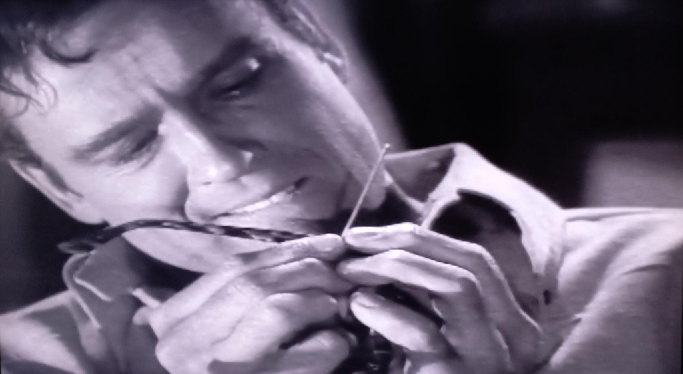






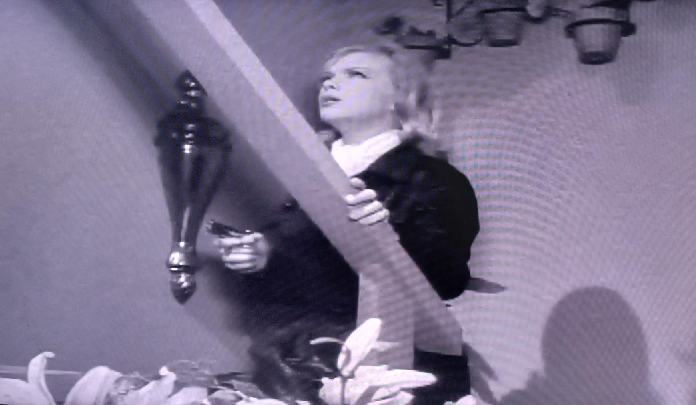




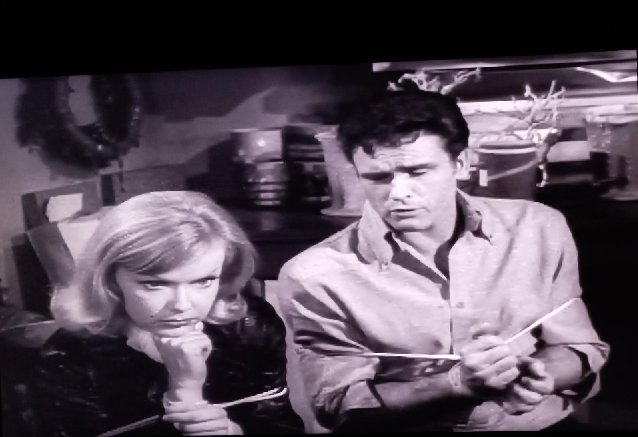
















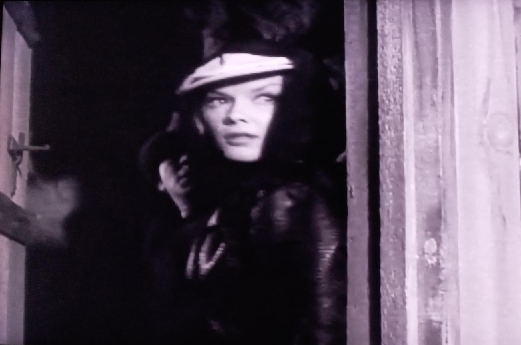














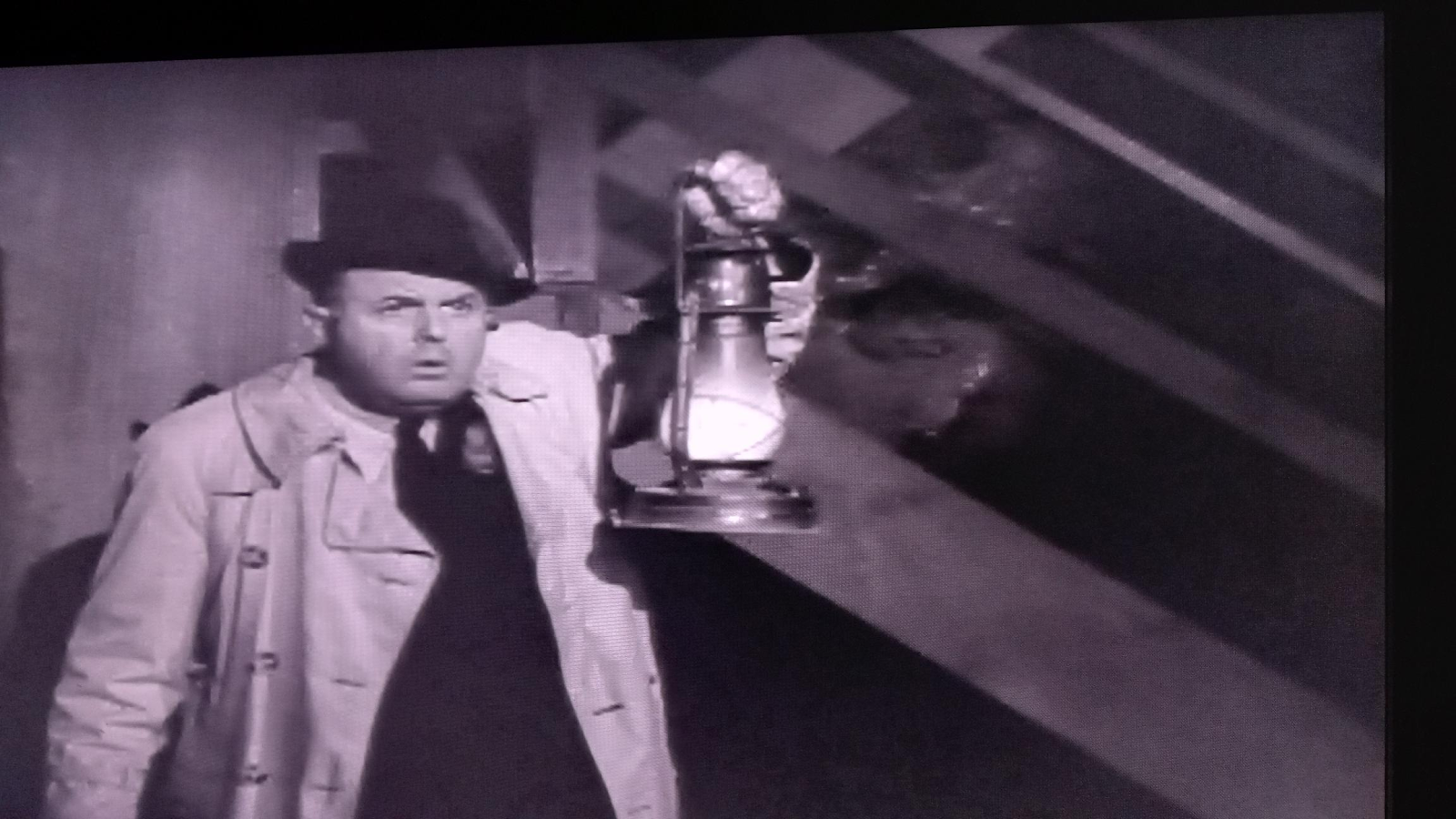

















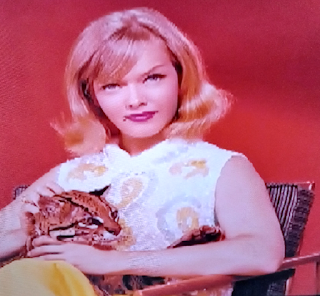


Comments
Post a Comment